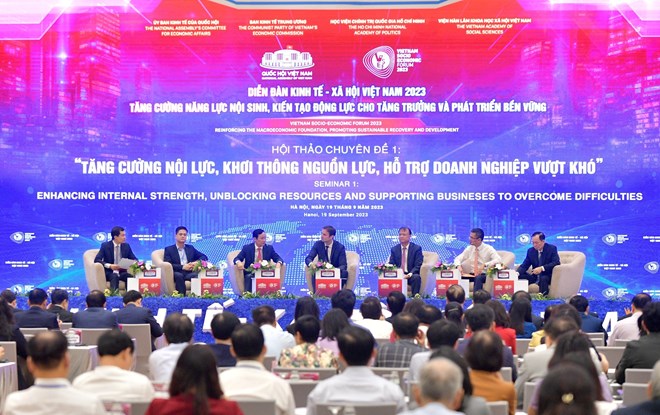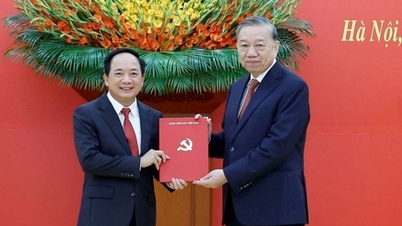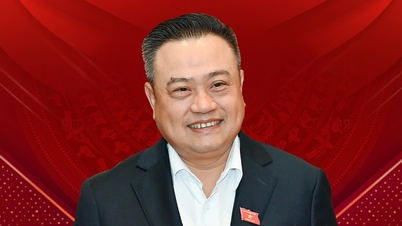
The business's desire is interest rate.
Within the framework of the Vietnam Socio-Economic Forum 2023 on the morning of September 19, Permanent Deputy Governor of the State Bank of Vietnam Dao Minh Tu mentioned the issue of monetary policy management from now until the end of the year and early 2024.
Mr. Dao Minh Tu acknowledged that monetary policy management has never been as difficult as in the past. Monetary policy management of other countries in the world has affected Vietnam's monetary policy management, especially after 2 years of the COVID-19 pandemic and the world's production situation.
Therefore, Mr. Dao Minh Tu said that the monetary policy management in recent times has been very flexible, cautious, and certain, implementing the goals of the National Assembly and the Government. In particular, it is necessary to coordinate with other macro policies to ensure competition as well as ensure the efforts of commercial banks and enterprises in the economy.
According to Mr. Dao Minh Tu, the desire of enterprises is interest rate. Managing interest rate is the most difficult in economic management of the banking and monetary sector.
Based on the Government's direction and the actual situation of the economy, Mr. Tu said that the State Bank has reduced the operating interest rate four times, at the same time creating room and liquidity for the market, for the economy, especially liquidity for credit institutions to create room for commercial banks with cheap capital to be able to lend at low interest rates.
The Deputy Governor of the State Bank emphasized that the credit growth limit is a tool to regulate the economy and regulate credit growth in general to control inflation. In 2023, the State Bank has greatly expanded it, creating a message that credit is ready to support and expand for businesses.
Mr. Dao Minh Tu affirmed that in the coming time, the State Bank will continue to maintain such a management viewpoint. Therefore, it is necessary to find a balance between interest rates and exchange rates and operate them tightly and reasonably. This is also the success of the State Bank in operating in the past time to maintain exchange rates and interest rates to achieve the target of controlling inflation.
In the credit sector, under the direction of the National Assembly and the Government, the State Bank has also proposed many solutions, including lowering interest rates of commercial banks; extending/postponing debts and interest payments that have not been paid for at least 1 year; and cutting costs, barriers, procedures, fees, and access conditions of commercial banks.
Mr. Dao Minh Tu said that the State Bank has issued many documents and institutions to create more favorable conditions, helping commercial banks to lend and apply technology in recent times...
Need to regain investor confidence
Speaking at the forum, Deputy Minister of Finance Vo Thanh Hung said that in the recent period, the Ministry of Finance has implemented many policies on tax exemption, reduction, and deferral as well as state budget revenues; implemented administrative reforms, and deployed electronic invoices in a number of areas. In addition, it has implemented salary reform in the public sector; increased spending to stimulate the economy... Thereby contributing to helping many businesses overcome difficulties; maintaining economic stability. As a result, Vietnam's economy is still considered a bright spot in the regional and world economy.
Speaking later, Mr. Jochen Schmittmann, resident representative of the International Monetary Fund (IMF) in Vietnam, said that the State Bank must be extremely careful about financial policies, interest rate issues, and the interbank market.
Mr. Jochen Schmittmann said it is necessary to strengthen policy implementation and resolve public investment bottlenecks, especially land use.
In addition, it is necessary to regain the confidence of both foreign and domestic investors in Vietnam. Strengthening the mechanisms for restructuring enterprises; building a framework for liquidating enterprises; debt settlement measures without going through the Court, and having reasonable debt liquidation measures.
The next important thing is to have stable and consistent laws related to investment; to ensure confidence for businesses, it is necessary to invest in electricity, infrastructure, reduce taxes, business costs, etc.
In addition, further efforts are needed to strengthen governance, apply national databases, and ensure legal certainty.
Source


![[Photo] Opening of the 14th Conference of the 13th Party Central Committee](https://vphoto.vietnam.vn/thumb/1200x675/vietnam/resource/IMAGE/2025/11/05/1762310995216_a5-bnd-5742-5255-jpg.webp)

























![[Photo] Panorama of the Patriotic Emulation Congress of Nhan Dan Newspaper for the period 2025-2030](https://vphoto.vietnam.vn/thumb/1200x675/vietnam/resource/IMAGE/2025/11/04/1762252775462_ndo_br_dhthiduayeuncbaond-6125-jpg.webp)









































































Comment (0)